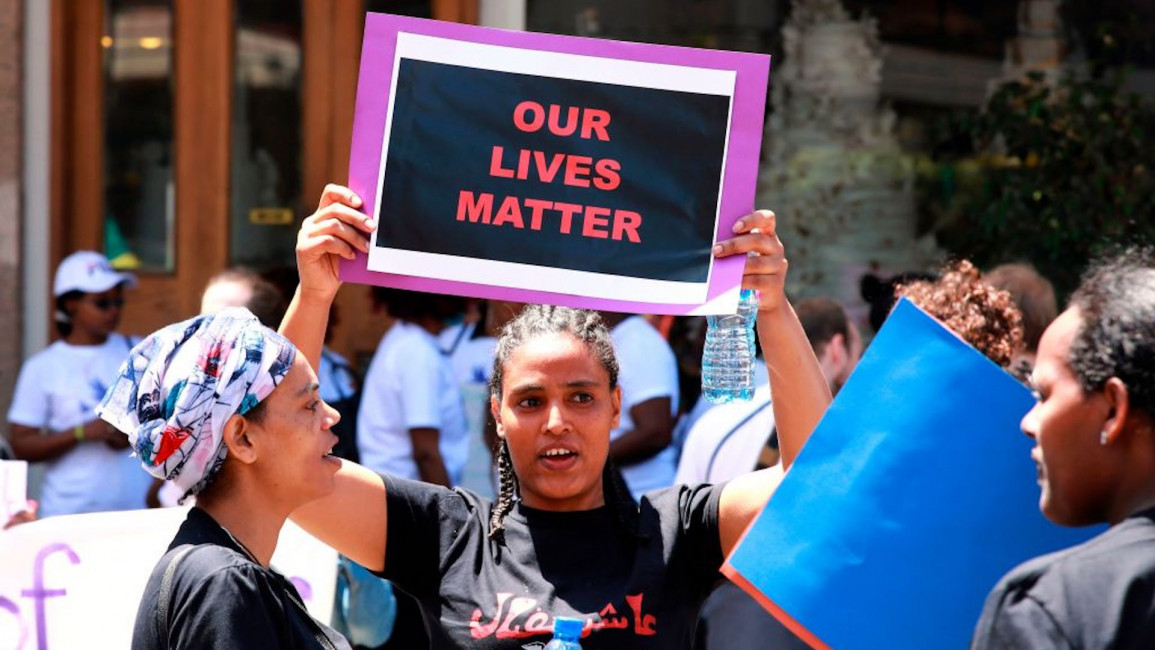Lebanon: 18 women migrant workers died in 'mysterious conditions' since April 2020, NGO finds
At least 18 women migrant domestic workers died in "mysterious conditions" in Lebanon over an 18-month period, a report released by a non-governmental organisation earlier this week has revealed.
The Anti-Racist Movement (ARM), a Lebanese NGO that focuses on racial, labour, migrant and gender issues in Lebanon, counted the deaths between April 2020 and October 2021.
"Authorities and media often referred to 'mysterious conditions' leading to the deaths," ARM said regarding their findings.
"Of course, potential homicide by employers was often ruled out despite evidence of abuse and threats of murder, and many deaths were deemed as suicide without actual or enough evidence."
Of the 18 who died, 10 were from Ethiopia, two from Bangladesh, one from Sierra Leone, and one from Ghana.
Just five of the 18 women have been identified by both name and nationality, according to ARM.
— Anti-Racism Movement | حركة مناهضة العنصرية (@ARM_Leb) April 11, 2022 |
The deaths were given little to no media coverage in Lebanon, the organisation said.
"Part of our work is to keep track of events and incidents related to migrants and refugees and make this information public," Farah Baba, advocacy and communications officer at ARM, told The New Arab.
"Many of these deaths were covered by random news websites and not major outlets."
Baba said it was difficult to chase up the authorities to find out more information about the women and the causes of their deaths, especially outside of Beirut where there is little migrant activism and where authorities tend not to cooperate.
"We needed to verify news on their deaths, so we called the municipalities in which the bodies were found, but they didn’t give us much information, including their names, ages or even nationalities. When they hear NGO, they often shout at us and hang up," said Baba.
"Most NGOs who work with migrants and refugees are based in Greater Beirut. Outside it’s difficult, especially in the rural north and south."
Since April 2020, we have documented the unfortunate deaths of 18 #migrant women in #Lebanon. Most of these deaths were barely covered in the media and most of the women remained anonymous to this day. pic.twitter.com/qsLM8NDynH
— Anti-Racism Movement | حركة مناهضة العنصرية (@ARM_Leb) April 11, 2022
Baba told The New Arab that one "exception" was a woman from Sierra Leone, who was reportedly very sick and denied medical care by her sponsors in Lebanon.
She died when she returned to her home country.
In another case, a Bengali woman was found mutilated in a bag. Investigations later revealed that her husband, also from Bangladesh, was behind the killing.
"The reason we considered this case mysterious was because there was no follow up. The reason it made headlines in Lebanon is because of how gruesome the crime was," Baba said.
ARM does not know if the bodies of the migrants have yet been returned home. Repatriations are carried out through the migrant workers' embassies, which coordinate with Lebanon’s General Security, Baba said.
Suing Kafala: Lebanon's modern-slavery system goes on trial for the first time in Ethiopian worker abuse case https://t.co/3kG4sRAlP2
— The New Arab (@The_NewArab) February 18, 2022
Asked whether diplomatic missions in Lebanon were generally helpful with issues related to their nationals in the country, Baba said some, and only sometimes.
"It depends on the situation. The Bangladeshi embassy is not very cooperative. The Philippines is the most helpful and cooperative, and they’ve even sued some sponsors in Lebanon accused of mistreating their Filipino housemaids."
She added that it was convenient for authorities when media outlets demonise domestic workers or report the cause of their deaths as “an accident”, or that the women were suicidal.
"Sometimes women try escaping the homes they work in because of the abuse they’re exposed to, fall from a high-rise, and die. Authorities list this as a suicide straight away, without bothering to investigate further."



